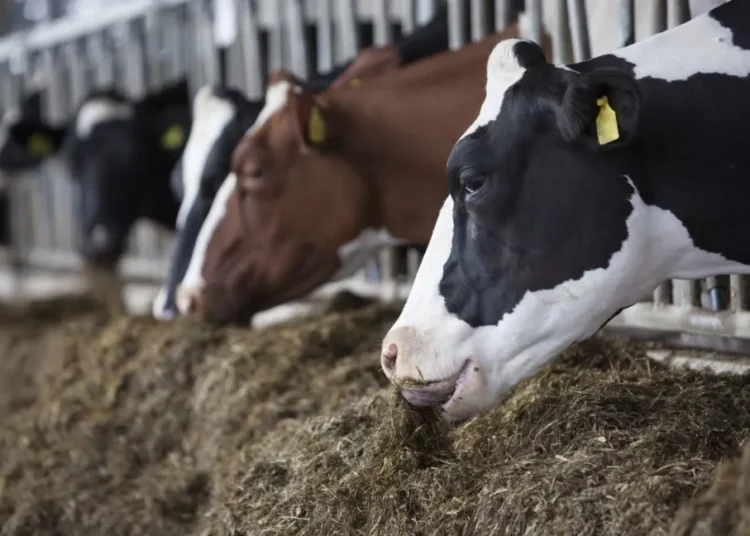In spite of Nigeria’s strategic position as having the fifth largest cattle herd in Africa, with an estimated 20 million cattle reserved for meat, milk and other dairy products, the country still spends huge foreign exchange on the importation of those products.
Recently, the National Bureau of Statistics revealed that a whopping N27.6 billion was spent on milk importation in three months, specifically in the first quarter of 2022. Though the figure indicates a N4 billion reduction in the amount spent for milk importation in the last quarter of 2021, it still calls for concern more so as records point to the fact that the nation spends $1.5 billion annually on milk importation.
Fundamentally, there is cause for worry because it defies logic that Nigeria, with its high number of cattle and an annual eight litre per capita consumption of milk, a figure far less than the global average of 44 litres of milk, still imports at least 60 percent of dairy products.
We recall that as part of moves to discourage importation and ultimately, ensure self-sufficiency in the production of milk, the federal government through the Central Bank of Nigeria, placed restrictions on access to foreign exchange for those wishing to import dairy products.
The apex bank said that the forex restriction on milk importation was to stop the use of scarce foreign exchange to import milk instead of using it to fund the sector for local production and stimulate job creation.
Clearly, the nation has what it takes to be self-sufficient in milk production and possibly export to other countries but that is not happening and even the CBN’s Forex restriction has not dissuaded milk importers.
How a nation that has over 20 million cattle can still spend such a humongous amount importing milk is one of the contradictions of the Nigerian story. With millions of cows, why is it difficult for the nation to produce, on a daily basis, at least five million litres of milk and thereby end importation?
Essentially, the huge expenditure on milk importation underscores the need for a critical examination, yet again, of the infrastructure in place to support hygienic processing of dairy products and, the much talked about national livestock transformation plan.
As for the infrastructure, it is abysmally low. For the fear of sounding like a broken record, we are wont to say that Nigerian government’s efforts in tackling infrastructure decay has fallen below expectations.
It is sad that we are still grappling with epileptic power supply, poor road network, and a high level of insecurity that have forced people to restrict their movements for fear of abduction for ransom. Indeed, no investment thrives under a situation as bleak as what obtains in the country presently. Tellingly, Nigeria’s huge infrastructure deficit has continued to impede economic growth.
For the national livestock transformation plan, this newspaper recalls that the federal government in 2019 launched this plausible initiative, though not without the usual controversy. Three years after the launch, its implementation has been, at best, slow. The perceivable lethargy is yet a reference point in the nation’s policy implementation record.
Without doubt, a dutiful implementation of the programme backed by a concerted war on insecurity and aggressive infrastructural and economic reforms through ease of doing business, will radically change the narrative about Nigeria’s balance of trade trajectory.
This newspaper is worried that Nigeria has continued to sink deeper into the abyss of importation with the nation wasting scarce resources on virtually everything that its citizens use because the environment is hostile to investment, local or foreign.
More worrisome is the fact that the government’s efforts at encouraging local production, like the One Local Government, One Product (OLOP) initiative of the Small and Medium Enterprises Development Agency-SMEDAN- and similar initiatives to boost exports have been nothing other than opportunities for some privileged persons to enrich themselves.
Little wonder, therefore, that nothing tangible comes out of these initiatives, which have cost the government quite a fortune in terms of financial resources. Sadly, too, in our view, successive governments have said more and acted less as far as the drive to diversify the economy is concerned.
As for the huge expenses on milk, this propensity to import deserves to be discouraged through implementation of an effective National Dairy Policy that would effectively regulate activities within the sector and ensure that the nation attains self-sufficiency in milk production.
What this still boils down to is for the government to consciously encourage investors to adopt ranching as the positive way of rearing cattle. It is a more effective way of controlling the animals in terms of what the eat and how they are maintained so as to ensure that they yield dairy products in the right quantity and quality. Not much yield can be expected from an animal that is constantly on the move most of the time under very inclement condition.





